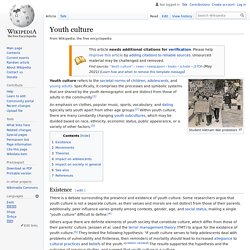

Teens Talk About Life (Video) Examples of Youth Culture. The term "youth culture" refers to the ways that teenagers conduct their lives.

Youth culture can pertain to interests, styles, behaviors, music, beliefs, vocabulary, clothes, sports and dating. The concept behind youth culture is that adolescents are a subculture with norms, mores, behaviors and values that differ from the main culture of older generations within society. Commonly-used Youth Culture Examples Each different generation will have their own youth culture that is reflective of their lives and times.
Understanding Youth Culture Psychologists such as Erik Erikson theorize that the primary goal in the developmental stage of adolescence is to answer the question: “Who am I?” Theorists such as Fasick agree that adolescents are in a confused state and that identity development happens during this time as they exert independence from parents and have a greater reliance on their peer groups. Peer Pressure (for Teens) - Nemours KidsHealth. "Now!

" whispered Suki. "Quick, while the clerk's not looking. " Heart pounding, Leah leaned against the store's unattended makeup display and slid two tubes of lipstick into her purse. She looked bored and detached as she followed her friends Suki and Jill out of the store, but inside she felt panicked. "I can't believe you made me do that," Leah wailed. "Relax," said Jill. She said nothing, but Leah knew she wouldn't have done that on her own. Who Are Your Peers? When you were a little kid, your parents usually chose your friends, putting you in play groups or arranging play dates with certain children they knew and liked. Your friends — your peers — are people your age or close to it who have experiences and interests similar to yours.
As you become more independent, your peers naturally play a greater role in your life. Youth culture - Wikipedia. Elements of youth culture include beliefs, behaviors, styles, and interests.

An emphasis on clothes, popular music, sports, vocabulary, and dating set adolescents apart from other age groups, giving them what many believe is a distinct culture of their own.[3] Within youth culture, there are many distinct and constantly changing youth subcultures. These subcultures' norms, values, behaviors, and styles vary widely, and may differ from the general youth culture. Understanding what adolescents think and do is fundamental to understanding the relationship between structure and agency, social patterns and individual action.[4] Existence of youth culture[edit] There is a debate about whether or not youth culture exists. Others argue that there are definite elements of youth society that constitute culture, and that these elements differ from those of their parents' culture.
Movements[edit] Mods also are a great example of a youth culture movement inspiring a popular lifestyle. Theories[edit] Peer group - definition of peer group in English. Noun A group of people of approximately the same age, status, and interests.

‘prodigies should spend as much time as possible with their peer group’ ‘But within his peer group, there is no one more respected or better liked or appreciated.’ ‘Maori children experiment with smoking to demonstrate and ensure their membership in the family and in their peer group.’ ‘For the horsepower, it has some of the best performance of its peer group.’ ‘Moreover, teachers may not have full access to children's daily experiences in the peer group.’ Peer - Wikipedia. From Wikipedia, the free encyclopedia Peer may refer to: In society[edit] An equal in age, education, or social class, as in peer group or social peer-to-peer processesA member of the peerage, a system of honours or nobility in various countries Organizations[edit] Partnership for European Environmental Research, a network of seven European environmental research centresPublic Employees for Environmental Responsibility, an organization of anonymous public employees promoting environmental responsibility[where?]

Other uses[edit] Peers. 20 Ways to Avoid Peer Pressure. Alison Bell (writing in Teen Magazine) suggests: 1.

Ask 101 questions. For example, if a pal pressures you to smoke, ask her why she smokes, how long she has smoked, if she minds having ashtray breath. 2. Say “No” like you mean it. Make eye contact, then say “No” forcefully, with authority. 3. For example, if you’re turning down an offer to smoke weed, say something like, “I like my brain the way it is, thanks.” 4. Don’t hesitate to state your position over and over again. 5. Practice saying ‘no’ in safe environments, like when your big brother asks you if you’d like to spend Saturday night doing his laundry. 6.
Leave the scene… make your exit. 7. If you know there’s going to be alcohol or drugs at a party, make other plans. 8. Find a friend who shares your values and back each other up. 9 Confront the leader of the pack. The best way to handle a peer pressure bully is to nab him (or her) when the two of you are alone and explain how you’re feeling and ask him/her to get off your case. 10.